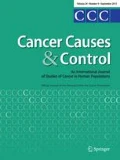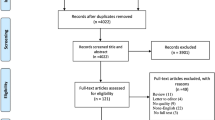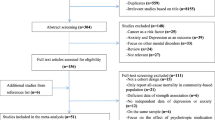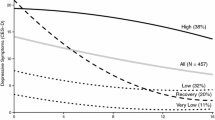Abstract
Purpose
A relationship between depression and the development of breast cancer has not been convincingly shown in the research conducted over the past three decades.
Methods
In an effort to better understand the conflicting results, a review was conducted focusing on the methodological problems associated with this literature, including time frame between the assessment of depression and the diagnosis of breast cancer and the use of somatic items in measuring depression. Fifteen breast cancer prospective studies were reviewed.
Results
While twelve of the studies found positive associations between depression and breast cancer development, three studies found negative associations. With regard to the predictive associations between depression and breast cancer incidence, the findings revealed that (a) studies using a longer time frame found a stronger association than studies using a shorter time frame and (b) studies utilizing depression measures that did not contain somatic items found a smaller association than studies utilizing depression measures that did contain these items.
Conclusions
Future studies should ensure that sufficient periods of time between the measurement of depression and the assessment of cancer and avoid measuring depression using somatic items.

Similar content being viewed by others
References
American Cancer Society. Cancer Facts & Figures 2010. Available from URL: http://www.cancer.org/acs/groups/content/@epidemiologysurveilance/documents/document/acspc-026238.pdf. Accessed 5 Sep 2011
Greer S (1983) Cancer and the mind. Br J Psychiatry 14:535–543
Snow HL (1893) Cancer and the cancer process. Churchill, London
Ader R, Cohen N, Felten D (1995) Psychoneuroimmunology: interaction between the nervous system and the immune system. Lancet 345:99–103
Andersen BL, Farrar WB, Golden-Kreutz D et al (1998) Stress and immune responses after surgical treatment for regional breast cancer. J Natl Cancer Inst 90:30–36
Schleifer SJ, Keller SE, Bartlett JA, Eckholdt HM, Delaney BR (1996) Immunity in young adults with major depressive disorder. Am J Psychiatry 153:477–482
Kiecolt-Glaser JK, Robles TF, Heffner KL, Loving TJ, Glaser R (2002) Psycho-oncology and cancer: psychoneuroimmunology and cancer. Ann Oncol 13:165–169
Glaser R, Thorn BE, Tarr KL, Kiecolt-Glaser JK, D’Ambrosio SM (1985) Effects of stress on methyltransfease synthesis: an important DNA repair enzyme. Br J Health Psychol 4:403–412
Pulaski L, Kania K, Ratajewski M et al (2005) Differential regulation of the human MRP2 and MRP3 gene expression by glucocorticoids. J Steroid Biochem Mol Biol 2005(96):229–234
Su F, Ouyang N, Zhu P et al (2005) Psychological stress induces chemoresistance in breast cancer by upregulating mdr1. Biochem Biophys Res Commun 329:888–897
Ticher A, Haus E, Ron IG et al (1996) The pattern of hormonal circadian time structure (acrophase) as an assessor of breast cancer risk. Int J Cancer 65:591–593
Butow PN, Hiller JE, Price MA, Thackway SV, Kricker A, Tennant CC (2000) Epidemiological evidence for a relationship between life events, coping style, and personality factors in the development of breast cancer. J Psychosom Res 49:169–181
Dalton SO, Boesen EH, Ross L, Schapiro IR, Johansen C (2002) Mind and cancer: do psychological factors cause cancer? Eur J Cancer 38:1313–1323
Garssen B (2004) Psychological factors and cancer development: evidence after 30 years of research. Clin Psychol Rev 24:315–338
McGee R, Williams S, Elwood M (1994) Depression and the development of cancer: a meta-analysis. Soc Sci Med 38:187–192
McKenna MC, Zevon MA, Corn B, Rounds J (1999) Psychosocial factors and the development of breast cancer: a meta-analysis. Health Psychol 18:520–531
Oerleman MEJ, van den Akker M, Schuurman AG, Kellen E, Buntinx F (2007) A meta-analysis on depression and subsequent cancer risk. Clin Pract Epidemiol Mental Health 3:29
Spiegel D, Giese-Davis J (2003) Depression and cancer: mechanisms and disease progression. Biol Psychiatry 54:269–282
Friberg S, Mattson S (1997) On the growth rates of human malignant tumors: implications for medical decision making. J Surg Oncol 65:284–297
Spratt JS, Meyer JS, Spratt JA (1996) Rates of growth of human solid neoplasms: part II. J Surg Oncol 61:68–83
Eskelinen M, Ollonen P (2011) Beck Depression Inventory in patients with breast disease and breast cancer: a prospective case–control study. In Vivo 25:111–116
Eskelinen M, Ollonen P (2011) Montgomery-Asberg Depression Rating Scale (MADRS) in healthy study subjects, in patients with breast disease and breast cancer: a prospective case–control study. Anticancer Res 31:1065–1069
Eskelinen M, Ollonen P (2011) Montgomery-Asberg Depression Rating Scale (MADRS) in healthy study subjects, in patients with breast disease and breast cancer: a prospective case–control study. Anticancer Res 31:1065–1069
Eskelinen M, Ollonen P (2011) Measurement of pessimism: Hopelessness Scale in healthy study subjects, in patients with breast disease and breast cancer: a prospective case–control study in Finland. Anticancer Res 31:4019–4023
Ollonen P, Lehtonen J, Eskelinen M (2005) Anxiety, depression and the history of psychiatric symptoms in patients with breast disease: a prospective case–control study in Kuopio, Finland. Anticancer Res 25:2527–2534
Dugan W, McDonald MV, Passik SD, Rosenfeld BD, Theobald D, Edgerton S (1998) Use of the Zung Self-Rating Depression Scale in cancer patients: feasibility as a screening tool. Psycho-Oncology 7:483–493
Wedding U, Koch A, Röhrig B et al (2007) Requestioning depression in patients with cancer: contribution of somatic and affective symptoms to Beck’s Depression Inventory. Ann Oncol 18:1875–1881
Endicott J (1984) Measurement of depression in patients with cancer. Cancer 53:2243–2248
Cavaugh S (1984) Diagnosing depression in the hospitalised patient with chronic medical illness. J Clin Psychiatry 45:13–16
Ryder AG, Yang J, Zhu X, Yao S, Yi J, Heine SJ, Bagby RM (2008) The cultural shaping of depression: somatic symptoms in China, psychological symptoms in North America? J Abnorm Psychol 117:300–313
American Psychiatric Association (1994) Diagnostic and Statistical Manual of Mental Disorders (DSM-IV), 4th edn. American Psychiatric Association, Washington, DC
Akechi T, Nakano T, Akizuki N et al (2003) Somatic symptoms for diagnosing major depression in cancer patients. Psychosomatics 44:244–248
Bleiker EM, Hendriks JH, Otten JD, Verbeek AL, van der Ploeg HM (2008) Personality factors and breast cancer risk: a 13-year follow-up. J Natl Cancer Inst 100:213–218
Bushman BJ, Wang MC (2009) Vote-counting procedures in meta-analysis. In: Cooper H, Hedges LV, Valentine JC (eds) The handbook of research synthesis and meta-analysis, 2nd edn. Russell Sage Foundation, New York, pp 207–220
Aro AR, de Koning HJ, Schreck M, Hendriksson M, Anttila A, Pukkala E (2005) Psychological risk factors of incidence of breast cancer: a prospective cohort study in Finland. Psychol Med 35:1515–1521
Bleiker EMA, van der Ploeg JHCL, Hendriks HJA (1996) Personality factors and breast cancer development: a prospective longitudinal study. J Natl Cancer Inst 88:1478–1482
Penninx BW, Guralnik JM, Pahor M et al (1998) Chronically depressed mood and cancer risk in older persons. J Natl Cancer Inst 90:1888–1893
Goldacre MJ, Wotton CJ, Yeates D, Seagroatt V, Flint J (2007) Cancer in people with depression and anxiety: record-linkage study. Soc Psychiatry Epidemiol 42:683–689
Nykliček I, Louwman WJ, Van Nierop PW, Wijnands CJ, Coebergh JW, Pop VJ (2003) Depression and the lower risk for breast cancer development in middle-aged women: a prospective study. Psychol Med 33:1111–1117
Gallo JJ, Armenian HK, Ford DE, Eaton WW, Khachaturian AS (2000) Major depression and cancer: the 13-year follow-up of the Baltimore epidemiologic catchment area sample (United States). Cancer Causes Control 11:751–758
Gross AL, Gallo JJ, Eaton WW (2010) Depression and cancer risk: 24 years of follow-up of the Baltimore epidemiologic catchment area sample. Cancer Causes Control 21:191–199
Jacobs JR, Bovasso GB (2000) Early and chronic stress and their relation to breast cancer. Psychol Med 30:669–678
Lichtman JH (1996) Are depressive symptoms, social networks and social support, or self-evaluated health measures predictive of cancer incidence and stage of diagnosis? Evidence from a prospective community based sample of elderly New Haven residents (Doctoral dissertation). Yale University, New Haven
Hahn RC, Petitti DB (1988) Minnesota Multiphasic Personality Inventory-rated depression and the incidence of breast cancer. Cancer 61:845–848
Hjerl K, Andersen EW, Keiding N et al (1999) Breast cancer risk among women with psychiatric admission with affective or neurotic disorders: a nationwide cohort study in Denmark. Br J Cancer 81:907–911
Dalton SO, Mellemkjaer L, Olsen JH, Mortensen PB, Johansen C (2002) Depression and cancer risk: a register-based study of patients hospitalized with affective disorders, Denmark, 1969–1993. Am J Epidemiol 155:1088–1095
Kaplan GA, Reynolds P (1988) Depression and cancer mortality and morbidity: prospective evidence from the Alameda County study. J Behav Med 11:1–13
Knekt P, Raitasalo R, Heliövaara M et al (1996) Elevated lung cancer risk among persons with depressed mood. Am J Epidemiol 144:1096–1103
Chen Y-H, Lin H-C (2011) Increased risk of cancer subsequent to severe depression-A nationwide population-based study. J Affect Disord 131:200–206
Liang J-A, Sun L-M, Muo C-H et al (2011) The analysis of depression and subsequent cancer risk in Taiwan. Cancer Epidemiol Biomark Prev 20:473–475
Schuurman AG, van den Akker M, Ensinck KTJL et al (2001) Does depression increase susceptibility for somatic disease? NWO-report. Research Institute Ex Tra, Maastricht
Kuehner C, Holzhauer S, Huffziger S (2007) Decreased cortisol response to awakening is associated with cognitive vulnerability to depression in a nonclinical sample of young adults. Psychoneuroendocrinology 32:199–209
Nolen-Hoeksema S, Morrow J (1991) A prospective study of depression and posttraumatic stress symptoms after a natural disaster: the 1989 Loma Prieta earthquake. J Pers Soc Psychol 61:115–121
Acknowledgments
The review was not supported by any kind of grant.
Conflict of interest
The authors declare that they have no conflict of interest.
Author information
Authors and Affiliations
Corresponding author
Rights and permissions
About this article
Cite this article
Pössel, P., Adams, E. & Valentine, J.C. Depression as a risk factor for breast cancer: investigating methodological limitations in the literature. Cancer Causes Control 23, 1223–1229 (2012). https://doi.org/10.1007/s10552-012-0014-y
Received:
Accepted:
Published:
Issue Date:
DOI: https://doi.org/10.1007/s10552-012-0014-y




